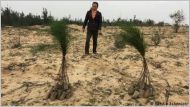Mapping carbon content in Thailand's forests

On 6 June 2006, Thailand's Ministry of Natural Resources and Environment and WWF Thailand formally launched their joint TREEMAPS project, which maps and continually monitors the carbon content of forests.
On 6 June 2006, Thailand's Ministry of Natural Resources and Environment and WWF Thailand formally launched their joint TREEMAPS project. TREEMAPS (Tracking Reductions in Carbon Emissions through Enhanced Monitoring and Project Support) aims to establish a carbon basemap for Thai forests and to continually monitor their carbon content using the "REDDLite" system. In a regional pilot project for reducing emissions from deforestation and forest degradation (REDD+), project partners are also testing new REDD+ financing mechanisms in the north-east of the country. The German Federal Ministry for the Environment, Nature Conservation and Nuclear Safety (BMU) is contributing over EUR 1.7 million to TREEMAPS through the International Climate Initiative (ICI).
Presiding over the opening ceremony in Bangkok were Chote Trachu, Permanent Secretary of the Thai Ministry of Natural Resources and Environment and Ingo Winkelmann, Minister and Deputy Head of Mission of the German Embassy in Bangkok, as well as Petch Manopawit, Manager of WWF's Conservation programme in Thailand.
TREEMAPS is the first initiative in South-East Asia to create a national map of forest land and carbon content as a basis for measurement. The relevant data is collected using satellite imagery, on-the-ground surveys and Light Detection and Ranging (LiDAR), a cutting-edge technology that makes use of airborne sensors. This data is then used by the Royal Thai Government as a solid, scientific basis to help plan new REDD+ measures and monitor changes in woodland vegetation.
In this manner, Thailand is paving the way at a national level for REDD+ mechanisms, such as results-based REDD+ financing, which may significantly accelerate future implementation of REDD+ projects. The project also strengthens political and technical capacities in the country and involves the local population in forest conservation. Furthermore, it helps preserve various national parks in the pilot region. The area holds UNESCO World Heritage status and contains ecosystems of global significance that serve as a habitat to over 800 different animal species, including tigers, elephants and gibbons.
The link has been copied to the clipboard
Contact
IKI Office
Zukunft – Umwelt – Gesellschaft (ZUG) gGmbH
Stresemannstraße 69-71
10963 Berlin






![[Translate to English:] Dr. Elsa Nickel, Ministerialdirektorin im BMUB; Foto: ©GIZ/Wolter](/legacy/_processed_/e/e/csm_171116_GIZ_PA_0067_Elsa_Nickel_BMUB_310_53e5a7828c.jpg)

